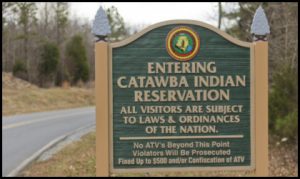In North Carolina and the plan from the Catawba Indian Nation to bring a casino resort to 16.5 acres of land it owns near the small community of Kings Mountain is reportedly in jeopardy following the filing of a federal lawsuit from the Eastern Band of Cherokee Indians.
According to a Wednesday report from the Smoky Mountain News, the United States Department of the Interior granted the Catawba Indian Nation permission in March to take the plot for the proposed development into trust despite the fact that it is located over the border from the federally-recognized tribe’s more traditional South Carolina homelands.
Profitable proposal:
The newspaper reported that this decision paved the way for the Catawba Indian Nation to construct a $273 million casino resort only about 30 miles from the region’s largest city, Charlotte, that would be almost totally free from state interference. The tribe earlier purportedly detailed that it also hopes to bring a hotel as well as multiple restaurants to its envisioned Cleveland County development so as to improve the economic standing of its members via the creation of up to 4,000 full-time jobs.
Economic alarm:
However, the Smoky Mountain News reported that the Eastern Band of Cherokee Indians opposes this scheme as its completion would likely cost the group around $100 million in lost annual revenues and subsequently put the jobs of a more than 4,000 of its own employees at risk. The newspaper reported that about one-third of the current clientele for this tribe’s existing Harrah’s Cherokee Casino Resort come from Charlotte while the Catawba Indian Nation’s envisioned venue would be located around 145 miles closer to this city and its population of some 873,000 inhabitants.
Copious contraventions:
The Eastern Band of Cherokee Indians is also responsible for North Carolina’s smaller Harrah’s Cherokee Valley River Casino and Hotel, which is located some 236 miles from Charlotte but only about 120 miles from the regional metropolises of Atlanta and Knoxville, and also reportedly believes that the Catawba Indian Nation violated several federal statutes in obtaining its land-into-trust decision.
Immediate embargo:
The Smoky Mountain News reported that the lawsuit from the Eastern Band of Cherokee Indians was filed in the United States District Court for the District of Columbia on March 17 and is seeking an injunction that would prevent the Catawba Indian Nation from starting work on its envisioned casino resort. The action purportedly names its rival tribe as well as the United States Department of the Interior, the Bureau of Indian Affairs and the several federal government officials including the newly-installed Secretary of the Interior, David Bernhardt, as defendants and claims that the land-into-trust decision was ‘flawed’ and ‘rushed.’
The newspaper reported that the Eastern Band of Cherokee Indians’ complaint, which is being officially supported by its Cherokee Nation of Oklahoma counterpart, moreover argues that the March finding ‘violates the plain language of federal law’ and is certain to result in irreparable harm to its own tribal sovereignty and cultural preservation.
Cultural concerns:
Russell Townsend, Tribal Historic Preservation Officer for the  Eastern Band of Cherokee Indians, reportedly told the newspaper that the land-into-trust decision for the Catawba Indian Nation had furthermore been based on a flawed environmental assessment that had failed to consider a range of issues including cultural resources, biological impacts and alternate sites in South Carolina. He purportedly additionally pointed to the 2005 discovery on the site for the proposed casino of a historic pottery kiln and human-made stone tools that has yet to be properly investigated.
Eastern Band of Cherokee Indians, reportedly told the newspaper that the land-into-trust decision for the Catawba Indian Nation had furthermore been based on a flawed environmental assessment that had failed to consider a range of issues including cultural resources, biological impacts and alternate sites in South Carolina. He purportedly additionally pointed to the 2005 discovery on the site for the proposed casino of a historic pottery kiln and human-made stone tools that has yet to be properly investigated.
Reportedly read a statement from Townsend…
“If the Kings Mountain site is taken into trust for the Catawba Indian Nation, the land will fall under the sovereign governance of the Catawba Indian Nation and the Eastern Band of Cherokee Indians’ Tribal Historic Preservation Officers will lose the right to consultation on and protection of [our] religious and cultural sites.”



